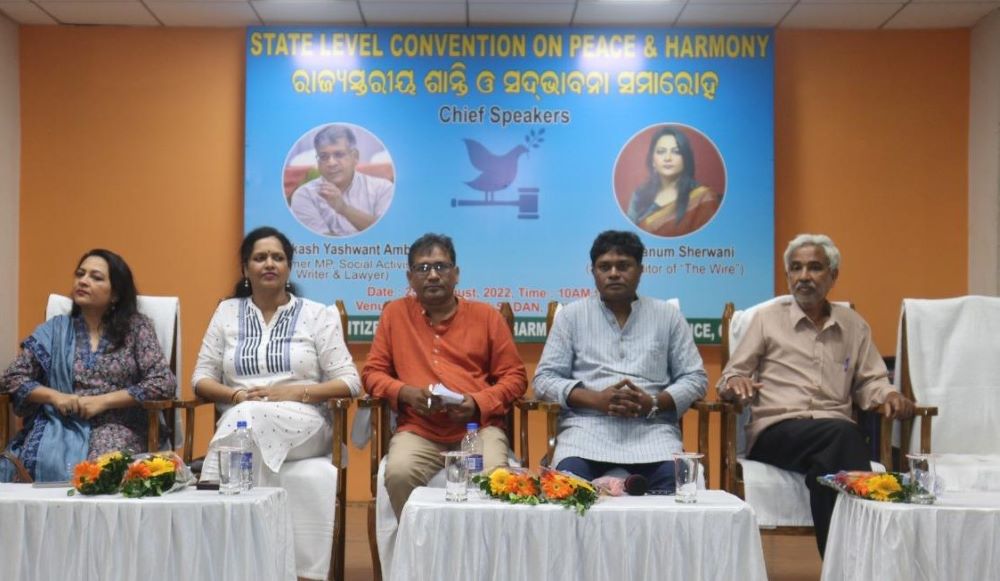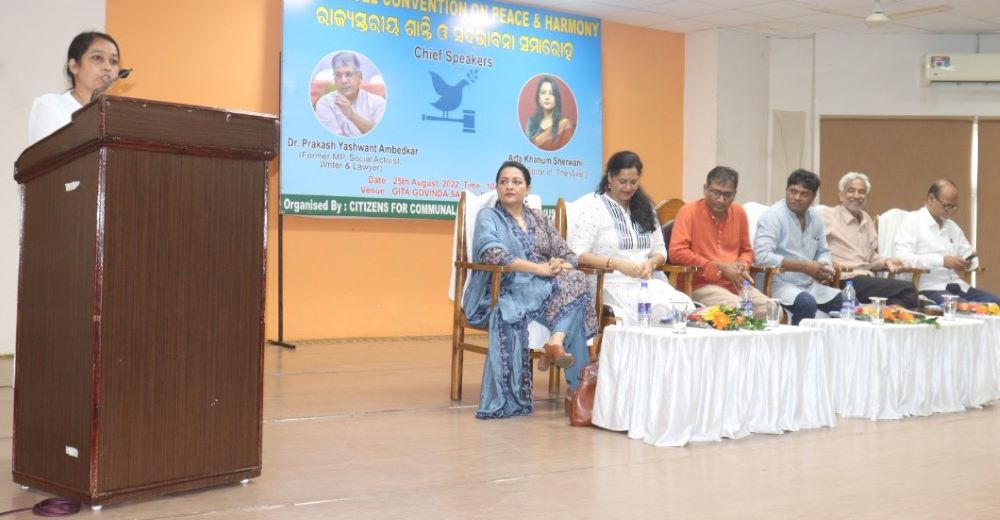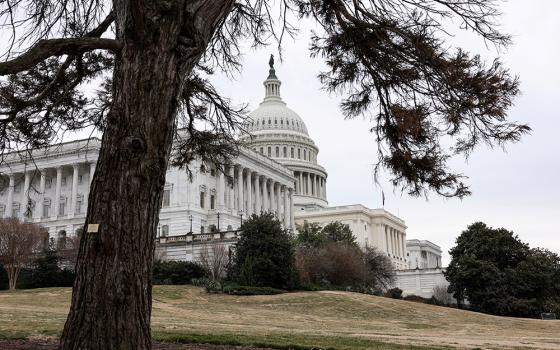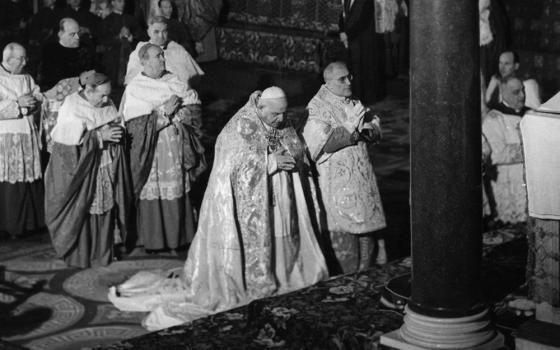
Panelists at the Aug. 25 convention on the 14th anniversary of the Kandhamal communal massacre included, from right, Arfa Khanum Sherwani, journalist; Vidya Dinker, president of the Indian Social Action Forum; Fr. Ajay Kumar Singh, human rights activist; Amiya Pandab, columnist; and Viswaypriya Kanungo, human rights activist. (Sujata Jena)
A state-level peace and harmony convention was held in Odisha Aug. 25 on the 14th anniversary of the Kandhamal communal massacre in this eastern Indian state.
For new readers, the 2008 Kandhamal communal violence stands out as an organized attack. It was the worst violence India's Christian community had faced in 300 years. During the violence, more than 100 Christians were killed, more than 75,000 families were displaced; 5,600 homes were destroyed, and 360 churches and church-run institutions were looted and destroyed.
More than 40 women were raped, molested and humiliated, including a young nun working in a pastoral center, who was gang-raped and paraded naked on the street in broad daylight. The struggle for relief, rehabilitation and justice continues in courts and government forums.
To observe this day, more than 300 civil society groups, political leaders, journalists, lawyers, writers, students, and academics, including some priests and nuns, across the state joined the daylong peace and goodwill convention in Bhubaneswar, the eastern Indian state of Odisha's capital.
The chief speakers at the event were Dr. Prakash Ambedkar, the grandson of the framer of the Indian Constitution; Baba Saheb Ambedkar; and Arfa Khanum Sherwani, a renowned journalist.
Several political party representatives participated and expressed their views. Everyone invariably and empathetically spoke about justice for the victims of anti-Christian violence and the urgency of promoting unity, brotherhood, humanism, secularism, solidarity, and social and economic justice at this trying time in India.
True followers of Christ know the pain of others. They do good to others without letting self-interest enter their minds.
What disturbed me was the response of the priests, religious and church at this event. Surprisingly, most of them were reluctant to be part of the solidarity meeting. A significant number of those who eventually attended the gathering left in the middle of the convention. Some even dismissed this as a political gathering.
The current political scenario in India is frightening. Attacks on Christian and Muslim religious minorities; saffronization (right-wing policies that attempt to glorify Hindu contributions to Indian history while undermining other contributions) of education and culture; rising inequalities that flow from flawed economic policies of the government; increasing atrocities on Dalits (formerly known as "untouchables," or people who belong to the lowest stratum of castes in India), tribals, and women; and muzzling freedom of expression and speech are all worrisome signs of fascism.
As the country celebrated its 75th anniversary of Independence Day on Aug. 15, Prime Minister Narendra Modi called to end misogyny, the Gujarat government released 11 convicts who were serving time for raping a pregnant Muslim woman in 2002.
Soon afterwards a 9-year-old Dalit boy in the western Indian state of Rajasthan died after being beaten by a teacher for drinking water from a pot that was meant for the upper caste.
Three tribal villages' farmland and huts were set on fire in the eastern Indian state of Odisha by the members of a forest protection group engaged by the state government. The list will go on.
Crimes against humanity are increasing. When the government does not safeguard the rights and privileges enshrined in the constitution, it is the right and duty of every citizen to hold the government responsible.
Jesus critiqued the unholy elements in his religion. He did not keep quiet when there was injustice, oppression, exploitation, and discrimination. The seven woes stated in the Gospel of Matthew (23:1-36) are a list of criticisms by Jesus against scribes and Pharisees for neglecting justice, mercy and faithfulness as they "followed the law."

Sr. Sujata Jena proposes a vote of thanks at the second session of the peace and harmony convention in Odisha on Aug. 25. (Courtesy of Sujata Jena)
The martyred priest Oscar Romero (1917-1980), a modern prophet, was convinced that he had to announce the Good News and that he could never do so without first denouncing all that was evil in his society. He was an outspoken critic of his government, the military and the other right-wing elements of his country, for their continued oppression and exploitation of the poor in San Salvador, El Salvador in Central America.
He condemned their heinous crimes. The day before his assassination, Romero delivered his now-famous Sunday homily, ordering soldiers to stop killing their countrymen. "It is time to regain your conscience. In the name of God and the name of the suffering people, I implore you, I beg you, I order you, stop the repression!" There has never been any doubt about who was responsible for his murder.
Human rights defenders are imprisoned worldwide. Prominent minority rights crusader Teesta Setalvad is the latest to be incarcerated in India. For most of them, humanity is their religion. They live their lives fighting for a crime against humanity. They know well that to understand the pain and suffering of people, one has to be a human with a good heart.
True followers of Christ know the pain of others. They do good to others without letting self-interest enter their minds.
It is the responsibility of every citizen, every baptized Christian, to save democracy. The more the church isolates itself and goes away from people, the further it moves from the teaching of Christ.
Advertisement
The role of the church, along with civil society, is pivotal today in establishing a just, peaceful, and harmonious society. For this, we need to:
- Raise our voice in opposition to all forms of discrimination, exclusion, exploitation, and human rights violations within the church and throughout society.
- Ensure that our efforts, initiatives, and resources reach the people who need them the most: poor, Dalits, tribals, minorities, migrant women and children.
- Keep ourselves abreast of what is happening in our society and respond to events with love, compassion, dignity.
- Accept, appreciate and celebrate differences to promote religious, cultural and linguistic pluralism.
- Network in a proactive way with other women and men and groups of goodwill that are working toward the establishment of a more humane and just society.
- Transform religious communities and church-managed institutions into all-inclusive communities in which all workers and staff join for meals, inter-religious prayer, planning and evaluation.
- Let transparency, accountability and participation characterize our church institutions.
- Collaborate in more meaningful ways.
Finally, Pope Francis offers a thought-provoking insight for everyone who wants to be saint and live a true and happy life. In his 2018 apostolic exhortation, Gaudete et exsultate ("Rejoice and be glad") he said "Holiness requires working for social justice. Holiness includes working to change social structures that oppress people."
Francis, the beloved leader of more than one-sixth of the world’s population, is reminding us that our goal must include the restoration of just social and economic systems, so there can no longer be exclusion.






